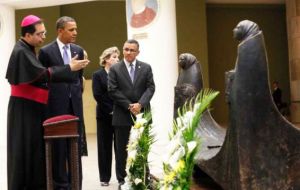MercoPress. South Atlantic News Agency
Obama in El Salvador shifts from economic success to drugs and immigration
 President Obama and Fumes at the grave of Archbishop Oscar Romero
President Obama and Fumes at the grave of Archbishop Oscar Romero President Barack Obama is nearing the end of a five-day tour of three Latin American nations to underscore the advance of democracy, and strong economic growth in the region.
The president held talks with El Salvador's president, and made a highly-symbolic visit to the grave of the assassinated archbishop who became a symbol of the country's troubled political past.
President Obama met with Salvadoran President Mauricio Funes, a former journalist elected two years ago with support of the political wing of the former Farabundo Marti guerrilla movement that battled U.S.-backed governments in the 1980's.
A key topic was U.S. assistance against the growing threat to El Salvador and other Central American nations from organized crime and drug gangs.
Earlier this year, the U.S. pledged $200 million to what is called the Central American Regional Security Intiative (CASI), aimed at bolstering government’s abilities to police their borders and expand community anti-gang programs.
Criminal organizations have moved into Central American countries because of pressure on them in Mexico and Colombia, and governments feel they haven't received enough help. President Funes welcomed the U.S. commitment to the program.
“Citizen security is not an issue that is only a problem for El Salvador, Honduras, Nicaragua isolatedly, not even Colombia or Mexico alone, it is a problem that attacks us as a region,” said President Funes.
The two leaders also discussed the sensitive issue here, as in other Central American nations, of U.S. immigration policy.
Two million Salvadorans live in the U.S., more than 200,000 under the U.S. government's Temporary Protective Status (TPS) program, allowing them to remain so they can continue to send money to their families in El Salvador.
President Obama welcomed what he called President Funes' commitment to creating more opportunity at home so Salvadorans don't leave for the United States. He also re-stated his determination, despite what he called opposition from Senate Republicans, to achieve comprehensive U.S. immigration reform.
“It is the right thing to do, this is the time to do it and I will continue to push hard to make it happen,” said President Obama. “It won't be easy. The politics of this are difficult. But I am confident that ultimately, we are going to get it done.”
In keeping with one of the major themes of this trip, President Obama praised El Salvador as being among examples in the Americas of successful transition to democracy.
El Salvador, he said, represents both opportunities and challenges facing the Americas, and he praised President Funes for “overcoming old divisions” while pursuing social progress that includes all segments of society.
The White House announced that President Obama is shortening his stay here by a few hours, departing earlier than on Wednesday for Washington.
But on Tuesday evening, the president followed through with a commitment to make a highly-symbolic gesture in this nation where some 75,000 people were killed during a 12-year civil war.
Accompanied by President Funes, Mr. Obama visited the grave of Archbishop Oscar Romero, the revered Catholic figure who was assassinated in 1980 by a member of a right-wing death squad. Mr. Obama lit a prayer candle before walking away from the tomb located in the national cathedral in San Salvador.
In his public statements during this trip, the president has recognized the success nations have had in moving to democracy and away from right wing dictatorships that, as in El Salvador and Chile, were supported at one time by the United States.




Top Comments
Disclaimer & comment rulesCommenting for this story is now closed.
If you have a Facebook account, become a fan and comment on our Facebook Page!